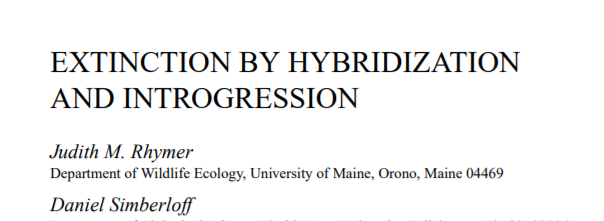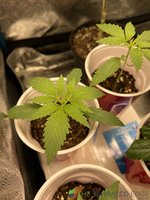vostok
Blooming
- User ID
- 156
In areas where hemp is grown, cultivation of seedless cannabis outdoors can be an impossibility! Nor are hemp growers happy about "marijuana" genes getting into their hemp genetics, creating unsellable "hot" hemp with a higher than 0.3% THC.
Well, these guys noted that triploids not only are (mostly) female sterile, but they produced more in the way of buds (inflorescence weight) than the same cross with normal numbers of chromosomes (diploid). So if you are in a hemp-growing area, a triploid marijuana might eventually provide the solution. (The downside, just like Montsanto's "Terminator" seeds, triploids insure repeat business for the seed vendor.)
Unfortunately if you want some, these triploid Cannabis seeds are not commercially available, so this is just a "heads up" for something that will pop up in the future.
Characteristics of the Diploid, Triploid, and Tetraploid Versions of a Cannabigerol-Dominant F 1 Hybrid Industrial Hemp Cultivar, Cannabis sativa 'Stem Cell CBG'. (USA) (full – 2021) Characteristics of the Diploid, Triploid, and Tetraploid Versions of a Cannabigerol-Dominant F1 Hybrid Industrial Hemp Cultivar, Cannabis sativa ‘Stem Cell CBG’

Hemp (Cannabis sativa L.) has recently become an important crop due to the growing market demands for products containing cannabinoids. Unintended cross-pollination of C. sativa crops is one of the most important threats to cannabinoid production and has been shown to reduce cannabinoid yield. Ploidy manipulation has been used in other crops to improve agronomic traits and reduce fertility; however, little is known about the performance of C. sativa polyploids. In this study, colchicine was applied to two proprietary, inbred diploid C. sativa inbred lines, ‘TS1-3’ and ‘P163’, to produce the tetraploids ‘TS1-3 (4x)’ and ‘P163 (4x)’. The diploid, triploid, and tetraploid F1 hybrids from ‘TS1-3’ × ‘P163’, ‘TS1-3 (4x)’ × ‘P163’, and ‘TS1-3 (4x)’ × ‘P163 (4x)’ were produced to test their fertilities, crossing compatibilities, and yields. The results indicated a reduction in fertility in the triploids and the tetraploids, relative to their diploid counterparts. When triploids were used as females, seed yields were less than 2% compared to when diploids were used as females; thus, triploids were determined to be female infertile. The triploids resulting from the crosses made herein displayed increases in biomass and inflorescence weight compared to the diploids created from the same parents in a field setting. Statistical increases in cannabinoid concentrations were not observed. Lastly, asymmetric crossing compatibility was observed between the diploids and the tetraploids of the genotypes tested. The results demonstrate the potential benefits of triploid C. sativa cultivars in commercial agriculture.
PDF HERE: https://www.ncbi.nlm.nih.gov/pmc/articles/PMC8234880/
FYI - Colchicine is poisonous. If you do plan to try a DIY, do the research first! Poisoning yourself to create some triploid cannabis plants, wouldn't be the brightest thing to do
Well, these guys noted that triploids not only are (mostly) female sterile, but they produced more in the way of buds (inflorescence weight) than the same cross with normal numbers of chromosomes (diploid). So if you are in a hemp-growing area, a triploid marijuana might eventually provide the solution. (The downside, just like Montsanto's "Terminator" seeds, triploids insure repeat business for the seed vendor.)
Unfortunately if you want some, these triploid Cannabis seeds are not commercially available, so this is just a "heads up" for something that will pop up in the future.
Characteristics of the Diploid, Triploid, and Tetraploid Versions of a Cannabigerol-Dominant F 1 Hybrid Industrial Hemp Cultivar, Cannabis sativa 'Stem Cell CBG'. (USA) (full – 2021) Characteristics of the Diploid, Triploid, and Tetraploid Versions of a Cannabigerol-Dominant F1 Hybrid Industrial Hemp Cultivar, Cannabis sativa ‘Stem Cell CBG’

Hemp (Cannabis sativa L.) has recently become an important crop due to the growing market demands for products containing cannabinoids. Unintended cross-pollination of C. sativa crops is one of the most important threats to cannabinoid production and has been shown to reduce cannabinoid yield. Ploidy manipulation has been used in other crops to improve agronomic traits and reduce fertility; however, little is known about the performance of C. sativa polyploids. In this study, colchicine was applied to two proprietary, inbred diploid C. sativa inbred lines, ‘TS1-3’ and ‘P163’, to produce the tetraploids ‘TS1-3 (4x)’ and ‘P163 (4x)’. The diploid, triploid, and tetraploid F1 hybrids from ‘TS1-3’ × ‘P163’, ‘TS1-3 (4x)’ × ‘P163’, and ‘TS1-3 (4x)’ × ‘P163 (4x)’ were produced to test their fertilities, crossing compatibilities, and yields. The results indicated a reduction in fertility in the triploids and the tetraploids, relative to their diploid counterparts. When triploids were used as females, seed yields were less than 2% compared to when diploids were used as females; thus, triploids were determined to be female infertile. The triploids resulting from the crosses made herein displayed increases in biomass and inflorescence weight compared to the diploids created from the same parents in a field setting. Statistical increases in cannabinoid concentrations were not observed. Lastly, asymmetric crossing compatibility was observed between the diploids and the tetraploids of the genotypes tested. The results demonstrate the potential benefits of triploid C. sativa cultivars in commercial agriculture.
PDF HERE: https://www.ncbi.nlm.nih.gov/pmc/articles/PMC8234880/
FYI - Colchicine is poisonous. If you do plan to try a DIY, do the research first! Poisoning yourself to create some triploid cannabis plants, wouldn't be the brightest thing to do






